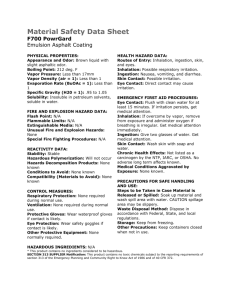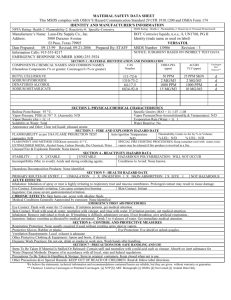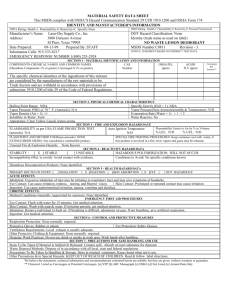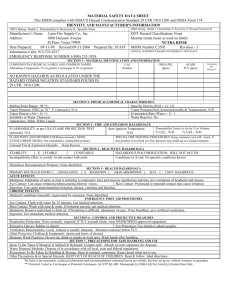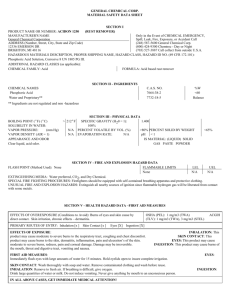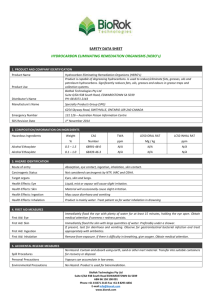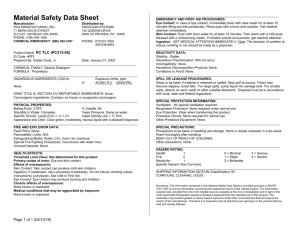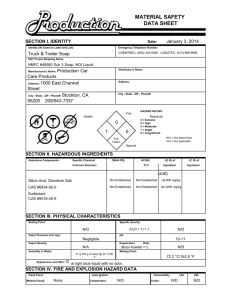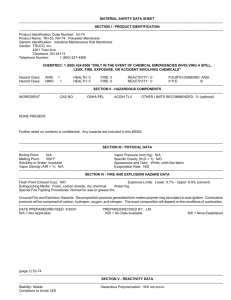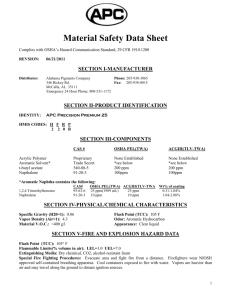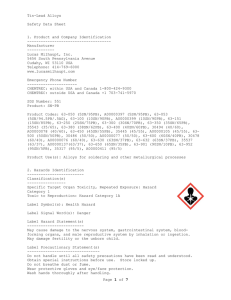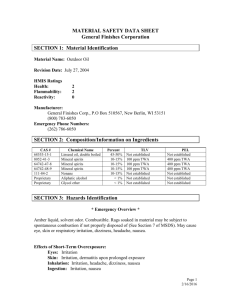EVAPLUBE 2200 MSDS: Safety Data Sheet
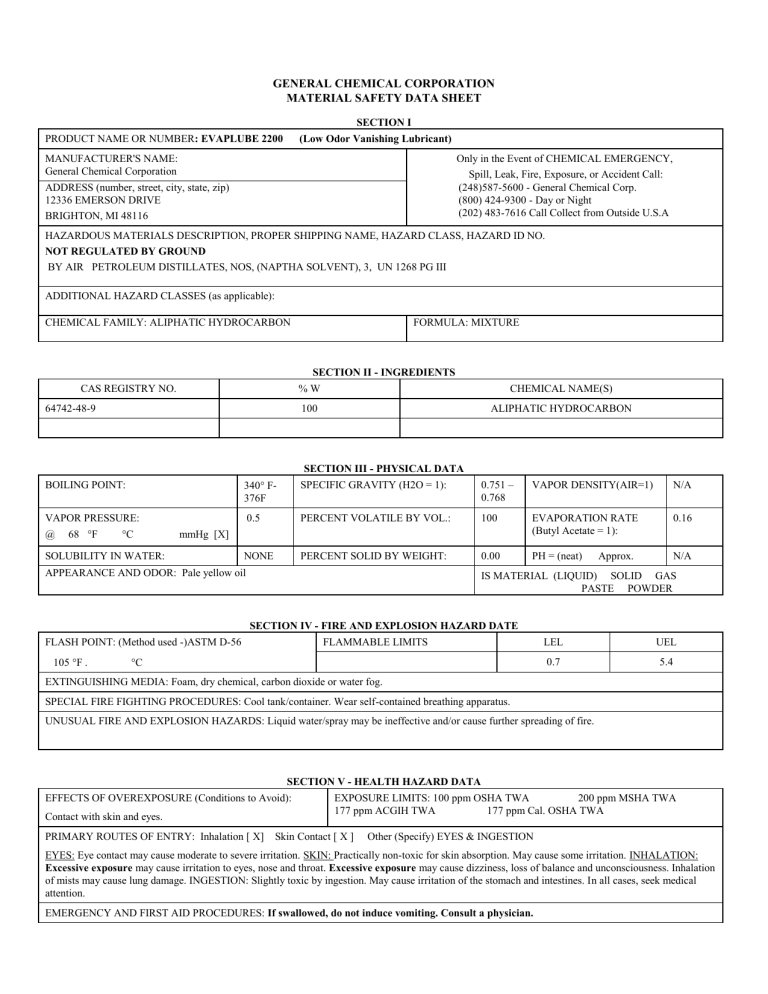
GENERAL CHEMICAL CORPORATION
MATERIAL SAFETY DATA SHEET
SECTION I
PRODUCT NAME OR NUMBER : EVAPLUBE 2200 (Low Odor Vanishing Lubricant)
MANUFACTURER'S NAME:
General Chemical Corporation
ADDRESS (number, street, city, state, zip)
12336 EMERSON DRIVE
BRIGHTON, MI 48116
Only in the Event of CHEMICAL EMERGENCY,
Spill, Leak, Fire, Exposure, or Accident Call:
(248)587-5600 - General Chemical Corp.
(800) 424-9300 - Day or Night
(202) 483-7616 Call Collect from Outside U.S.A
HAZARDOUS MATERIALS DESCRIPTION, PROPER SHIPPING NAME, HAZARD CLASS, HAZARD ID NO.
NOT REGULATED BY GROUND
BY AIR PETROLEUM DISTILLATES, NOS, (NAPTHA SOLVENT), 3, UN 1268 PG III
ADDITIONAL HAZARD CLASSES (as applicable):
CHEMICAL FAMILY: ALIPHATIC HYDROCARBON
CAS REGISTRY NO.
FORMULA: MIXTURE
SECTION II - INGREDIENTS
% W CHEMICAL NAME(S)
64742-48-9
BOILING POINT: 340
F-
376F
100
SECTION III - PHYSICAL DATA
SPECIFIC GRAVITY (H2O = 1):
ALIPHATIC HYDROCARBON
0.751 –
0.768
VAPOR DENSITY(AIR=1) N/A
VAPOR PRESSURE:
@ 68
F
C mmHg [X]
0.5 PERCENT VOLATILE BY VOL.: 100 EVAPORATION RATE
(Butyl Acetate = 1):
0.16
SOLUBILITY IN WATER: NONE PERCENT SOLID BY WEIGHT: 0.00 PH = (neat) Approx. N/A
APPEARANCE AND ODOR: Pale yellow oil
IS MATERIAL (LIQUID) SOLID GAS
PASTE POWDER
SECTION IV - FIRE AND EXPLOSION HAZARD DATE
FLASH POINT: (Method used -)ASTM D-56
105
F .
C
FLAMMABLE LIMITS LEL
0.7
UEL
5.4
EXTINGUISHING MEDIA: Foam, dry chemical, carbon dioxide or water fog.
SPECIAL FIRE FIGHTING PROCEDURES: Cool tank/container. Wear self-contained breathing apparatus.
UNUSUAL FIRE AND EXPLOSION HAZARDS: Liquid water/spray may be ineffective and/or cause further spreading of fire.
SECTION V - HEALTH HAZARD DATA
EFFECTS OF OVEREXPOSURE (Conditions to Avoid): EXPOSURE LIMITS: 100 ppm OSHA TWA 200 ppm MSHA TWA
177 ppm ACGIH TWA 177 ppm Cal. OSHA TWA
Contact with skin and eyes.
PRIMARY ROUTES OF ENTRY: Inhalation [ X] Skin Contact [ X ] Other (Specify) EYES & INGESTION
EYES: Eye contact may cause moderate to severe irritation. SKIN: Practically non-toxic for skin absorption. May cause some irritation. INHALATION:
Excessive exposure may cause irritation to eyes, nose and throat. Excessive exposure may cause dizziness, loss of balance and unconsciousness. Inhalation of mists may cause lung damage. INGESTION: Slightly toxic by ingestion. May cause irritation of the stomach and intestines. In all cases, seek medical attention.
EMERGENCY AND FIRST AID PROCEDURES: If swallowed, do not induce vomiting. Consult a physician.
SECTOIN VI – FIRST AID – EVAPLUBE 2200
INHALATION: Move person to fresh air. If not breathing, give artificial respiration. Seek medical attention.
SKIN: Wash with soap and water until no odor remains. Remove and wash clothing before reuse. If irritation occurs, seek medical attention. EYES: Flush with plenty of water for at least 15 minutes. Seek medical attention.
INGESTION: Obtain medical attention. Do not induce vomiting . If vomiting occurs, avoid aspiration of vomit into lungs.
STABILITY UNSTABLE
SECTION VII - REACTIVITY DATA
CONDITIONS TO AVOID: Heat and ignition sources.
STABLE X
INCOMPATIBILITY(Materials to Avoid): STRONG OXIDIZING AGENTS
HAZARDOUS DECOMPOSITION PRODUCTS: Oxides of carbon, nitrogen and phosphorus.
HAZARDOUS
POLYMERIZATION
MAY OCCUR CONDITIONS TO AVOID:
WILL NOT
OCCUR
X
SECTION VIII - SPILL OR LEAK PROCEDURES
STEPS TO BE TAKEN IN CASE MATERIAL IS RELEASED OR SPILLED: Soak up on oil absorbent material. Remove all sources of ignition. Keep from contaminating sewers and waterways.
WATER DISPOSAL METHOD: In accordance with state, local and federal regulations.
SECTION IX - SPECIAL PROTECTION INFORMATION
RESPITORY PROTECTION: NIOSH approved if vapor concentration exceeds recommended TLV.
VENTILATION: LOCAL EXHAUST: If vapor concentrations exceed recommended levels.
MECHANICAL: Control fumes to suggested guidelines.
SPECIAL:
OTHER:
PROTECTIVE GLOVES: Oil resistant. EYE PROTECTION:
Safety glasses.
OTHER PROTECTIVE EQUIPMENT: Face shield, chemical apron, and safety shower if contact is anticipated.
SECTION X - SPECIAL PRECAUTION
PRECAUTIONS TO BE TAKEN IN HANDLING AND STORAGE: Store in cool, well-ventilated area. Keep containers closed when not in use. Empty containers contain product residues and retain label hazard precautions. Do not cut or weld containers. Properly bung and promptly return empty containers to a drum reconditioner.
OTHER PRECAUTIONS:
DATE ISSUED : 30-MARCH-2010 SUPERSEDES: 20-MARCH-2009
Information presented herein has been complied to be dependable and is accurate and reliable to the best of our knowledge and belief, but is not guaranteed to be so. Nothing herein is to be construed as recommending any practice or any product violation of any patent or in violation of any law or regulation. It is the user's responsibility to determine for him/herself the suitability of any material for a specific purpose and to adopt such safety precautions as may be necessary. We make no warranty as to the results to be obtained in using any material and, since conditions of use are not under our control, we must necessarily disclaim all liability with respect to the use of any material supplied by us.
